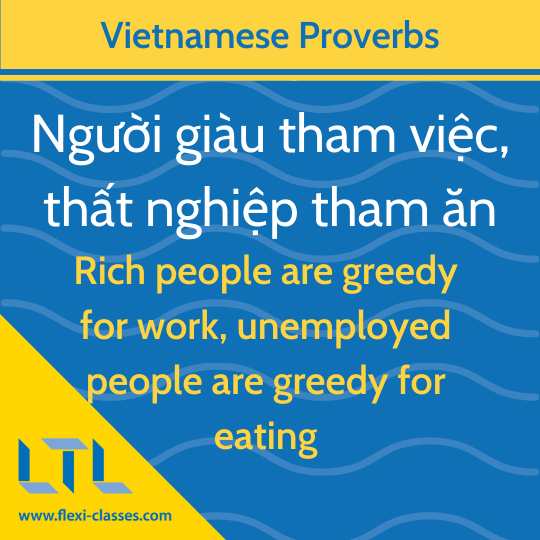Vietnamese Proverbs // The Key To Sounding Like A Native Speaker
10 Vietnamese Proverbs To Level Up Your Language Skills
Did you know that learning Vietnamese proverbs is a super way to sound like a native and impress the locals!

Vietnam is a country with more than a thousand years of history.
Our ancestors have distilled their fair share of life challenges into a wealth of Vietnamese proverbs.
Looking through this collection of proverbs is a way to look into the heart and soul of many Vietnamese generations.
So below is a list of 10 popular Vietnamese proverbs that we commonly use in our daily conversations. The proverbs are arranged from short to longer ones, so you can slowly get used to them as your Vietnamese level increases.
TOP TIP – Did you know Tục ngữ is Proverb in Vietnamese
Vietnamese Proverb #1 – Thùng rỗng kêu to
Vietnamese Proverb #2 – Ăn cháo đá bát
Vietnamese Proverb #3 – Ngựa non háu đá
Vietnamese Proverb #4 – Trâu buộc ghét trâu ăn
Vietnamese Proverb #5 – Thất bại là mẹ thành công
Vietnamese Proverb #6 – Sông có khúc, người có lúc
Vietnamese Proverb #7 – Cha mẹ sinh con, trời sinh tính
Vietnamese Proverb #8 – Đi đêm lắm có ngày gặp ma
Vietnamese Proverb #9 – Lửa thử vàng, gian nan thử sức
Vietnamese Proverb #10 – Có công mài sắt, có ngày nên kim
BONUS PROVERBS – Level Up
Vietnamese Proverbs – FAQ’s
Vietnamese Proverb #1 – Thùng rỗng kêu to
Translation – Empty barrels make loud noises.

Interestingly, this Plato quote has a Vietnamese version as well, most probably because true wit transcends cultures.
The meaning of this Vietnamese proverb is similar to the English version as well, it means that those who know the least are usually those who are the loudest or most opinionated.
Another way to look at this is how Vietnamese people would pay respects to those of lesser words.
There is an impression that the more they know, the less they would speak so a wise man is usually the quietest.
Those of you who come from a more extroverted culture, what do you think about this?
Vietnamese Proverb #2 – Ăn cháo đá bát
Translation – Kicking the bowl after eating all the porridge.
Porridge is easy to eat and uses little rice to make so it is a common food to help sick and impoverished people.
This Vietnamese proverb brings about a truly relatable story: someone who is in need, after you have fed them, would kick away the bowl of porridge.
Essentially it refers to someone being ungrateful.
It is easy to visualise the ungratefulness you would feel from this person. That is exactly what this Vietnamese proverb is trying to describe.

Vietnamese Slang // 8 Words You Need To Learn
Vietnamese Slang // Learn How To Speak Like A Native Want to level up your Vietnamese to levels you’ve never seen before? Learning Vietnamese Slang is a great way to start! Vietnamese slang, as with any language, is used frequently…
Vietnamese Proverb #3 – Ngựa non háu đá
Translation – Foals are eager to kick.
It is quite an odd image, comparing a young and aggressive person to a foal who keeps wanting to show off their skills and pick fights.
It is part of a call out, or a warning for young people to “hold their horses” and be more careful with their actions.
Don’t jump straight in but take a moment to ponder ones actions.
What would be the equivalent saying in your culture? Tell us below.
Vietnamese Proverb #4 – Trâu buộc ghét trâu ăn
Translation – A tied-up buffalo hates an eating buffalo.

Vietnam originates from an agricultural culture, so a buffalo is an irreplaceable part of most Vietnamese’s daily life.
This Vietnamese proverb uses the image of “a tied-up buffalo” for “a person under constraints” and “an eating buffalo” for someone who is enjoying benefits.
It is normal for jealousy to occur when your hands are tied while someone else is reaping all the benefits right?
On the contrary, isn’t it better to know why someone may be hating you out of nowhere?
Our ancestors have such a nice way to pass down their wisdom via Vietnamese proverbs like this.

Vietnamese Dialects // North or South?
North vs South? Vietnamese dialects can vary quite significantly. This is one of the very early questions a Vietnamese learner asks themselves.
Vietnamese Proverb #5 – Thất bại là mẹ thành công
Translation – Failure is the mother of success.
A classic Vietnamese proverb so popular, you can find it in many languages.
The words mean exactly you’d expect.
The more you experience failure, the closer you are to success.
Vietnamese Proverb #6 – Sông có khúc, người có lúc
Translation – Rivers have meanders, human life has phases.
Whenever you or someone you know is facing a difficult time in life, Vietnamese people would say “sông có khúc, người có lúc” to comfort you.
Just like a long river that has many meanders, human life has many phases, you can be poor and struggling today but who knows, tomorrow you may find a golden opportunity or a mentor/helper that would turn your life around?
Sometimes people can also use this Vietnamese proverb as a warning so you’d be cautious even when being at the top of wealth and success.
This Vietnamese proverb uses the rhyming of “khúc” – “meander” and “lúc” – “period/phase” to connect two parts of the Vietnamese proverb, which makes it both a profound and pleasing on the ears also.
Vietnamese Proverb #7 – Cha mẹ sinh con, trời sinh tính
Translation – Parents give birth to their children, God gives them their characteristics.

Asian parents are famous for having extremely high expectations of their child, and as a result, can be extremely strict when raising them.
That being said, generations of Vietnamese parents have also recognised unexpected external factors that can affect the person their child will eventually turn into.
That is why they came up with this Vietnamese proverb to comfort those distressed parents when their children grow up different from what they expected.
This Vietnamese proverb can also be used to give the children some leeway with their quirks.
This Vietnamese proverb uses parallel structure to link the two sections together.
The structure is “Subject 1 + Verb + Object 1, Subject 2 + Verb + Object 2”, where the verb stays the same, but a change in the subject will lead to a change in the object.
This creates two scenarios that although based on one same action, leads to different results, and therefore, puts the emphasis on their opposing nature.
Vietnamese Proverb #8 – Đi đêm lắm có ngày gặp ma
Translation – If you keep going out at night, eventually you will meet ghosts.
It is a common understanding that ghosts only live in the dark.
Not everyone sees ghosts, but if someone keeps going out at night, eventually you will bump into one.
This is a warning for people who keep doing bad deeds: “Watch out, eventually you will reap what you sow”.

The Best Vietnamese Podcasts You Need To Know About (for 2025)
Podcasts are a super way to learn. With that being said we have prepared a list of the top 10 Vietnamese podcasts to help improve your language skills.
Vietnamese Proverb #9 – Lửa thử vàng, gian nan thử sức
Translation – Fire tests gold, tough situations tests endurance.
This is a Vietnamese proverb to encourage people to try harder or to comfort those who are going through challenging times.
A lighter test is a common way to check whether a piece of gold jewellery is made of real gold.

If you apply a lighter flame to gold jewellery, real gold will shine brighter while fake gold will darken, change colour or expose its true nature underneath.
Applying this to a real-life situation, this Vietnamese proverb means to say: This is just a test. Believe in yourself, you will overcome this and shine bright like pure gold!
This Vietnamese proverb also uses a parallel structure to emphasise the action.
In this case, “thử” or “test” is the chosen verb, but instead of using two different scenarios, “fire tests gold” and “tough situations tests endurance” are similar courses of action.
So, by putting them parallel in one sentence, the verb “test” is even more emphasised.
Vietnamese Proverb #10 – Có công mài sắt, có ngày nên kim
Translation – Keep grinding the metal, one day it will turn into a needle.
This Vietnamese proverb may sound quite odd in this modern day world.
“Why would I spend ages grinding a piece of metal when I can just go to a shop and buy myself a pack of needles?”.
It makes sense, but remember that years ago, we did not have the technology we do today.
So, by putting in the hard work, your efforts will turn a rough piece of metal into something beautiful, shiny, and useful like a needle.
What a profound way to encourage people to keep on the hard work, especially when they are doubting their result right?
This proverb also uses the parallel structure to emphasise the action “có” – “to have” or in this situation “to have put in the effort”. The subjects of both parts are omitted to keep the proverb concise and focus on the verb “có”.

31 Examples of Vietlish // A Simple Equation
Vietlish = Vietnamese + English. You might be intimidated by learning Vietnamese but there’s no need with these 33 loanwords in Vietnamese.
BONUS PROVERBS – Level Up
Throughout our thousand years of history, Vietnamese people have been through countless wars to settle civil conflicts, finding the right person for the throne and above all, chasing away invaders.
We are no strangers to hard work, endurance, and have a firm belief in a good outcome at the end – the spirit you can see in many of the above Vietnamese proverbs.
That is how we survived and are thriving as South East Asia rises to be the next destination for economic growth.
Moreover, we are also generous and accepting of people from many different backgrounds, even those we have prior conflicts with.
You can see many nationalities living and working in Vietnam now, from Chinese, Taiwanese, Singaporean, South Korean, Japanese, American, French and British.
To prove our generosity, here are two bonus Vietnamese proverbs as a gift for you!
If you have learned Vietnamese to an intermediate level, try learning the following longer proverbs!
BONUS VIETNAMESE PROVERB #1 – Người giàu tham việc, thất nghiệp tham ăn
Translation – Rich people are greedy for work, unemployed people are greedy for eating.
Self-made millionaires in Vietnam are not a strange concept. The bountiful nature of the South of Vietnam’s land has always rewarded hardworking people justly.
That is why it is common to see rich Vietnamese people who boast money, yet remain hardworking. Likewise those who got rich thanks to their hard-work and thus, never forget where their current wealth comes from.

Thus the “tham việc” – “greedy for work” part.
In comparison are those who are unemployed, either because of themselves or their circumstances.
Folk wisdom said that unemployed people are greedy for eating, which may sound discriminating at first, but upon closer inspection, does make sense.
When you have to struggle for food daily, you will focus more on things that can fill your growling stomach first before thinking about what to do for the long term.
Another situation is when this person genuinely lacks drive. They only want to spend their days lazing around eating and do not care for finding themselves a proper job.
Thus the “tham ăn” – “greedy for eating” part.
Either way, this Vietnamese proverb is meant to be a wake-up call and a nudge to unemployed people.
Maybe it is time to look at your life from a different perspective and find a job?
You will see in here the common parallel structure with the verb “tham” – “greedy for” repeated twice for emphasising effect.
BONUS VIETNAMESE PROVERB #2 – Người làm nên của, của không làm nên người
Translation – A person makes wealth, wealth does not make a person.
As we all know, “sông có khúc, người có lúc”, sometimes life takes a bad turn, and all your wealth goes down the drain. But fear not!

Because there were many people in a similar situation in the past, and they would tell you that you are the one who creates wealth, not the other way around.
As long as you are still alive and keep working hard, you will be able to recreate what you have lost.
You as a person and human in a general sense, are the most valuable wealth.
Coming from a nation that has recreated itself countless times through wars and destruction, who could back up this Vietnamese proverb better?
So, are you one of those who are going through tough times in life? If so, pick yourself up, dust yourself off and let us continue fighting!
You still have the most valuable wealth you could ever have!
BONUS POST | We wrote an article showing you the best Vietnamese Slang terms to use today which we think you’ll like!
What do you think about our list of 10 most popular Vietnamese proverbs?
Share with us below and if you want to learn more beautiful Vietnamese proverbs, contact LTL today and one of your 24/7 student consultants will contact you right away!
Enjoy learning Vietnamese!

Do you have similar proverbs and idioms in your own language? You can also learn about Korean Proverbs and the most common Chinese idioms whilst you’re here as well.
Vietnamese Proverbs – FAQs
How do you say “Proverb” in Vietnamese?
Proverb in Vietnamese is Tục ngữ.
How do you say “Vietnamese Proverb” in Vietnamese?
Vietnamese Proverb in Vietnamese is Tục ngữ Việt Nam.
What is a common Vietnamese proverb?
As with many languages there are hundreds of proverbs that can be used in daily chat.
Thùng rỗng kêu to is widely used and translates to Empty barrels make loud noises.
The meaning of this Vietnamese proverb is similar to the English version as well, it means that those who know the least are usually those who are the loudest or most opinionated.
Where can I learn more Vietnamese Proverbs?
This article has 10 (plus two bonus) proverbs for you to learn.
If you want to discover more about Vietnamese we recommend you take a look at our Vietnamese Flexi Classes where you can study Vietnamese with a real, native speaking teacher live.
Where to learn Vietnamese for free?
Visit our Vietnamese Grammar Bank for free language lessons 🙂
For studying Vietnamese in Vietnam with professional teachers, make sure to have a look at our programs in Saigon and Hanoi, or contact us to start planning!
FANCY LEARNING VIETNAMESE? We know you’ll love our top-rated online Vietnamese courses. We offer a 7-day free trial to all new online students where you can study 24/7.
What’s more – we even offer Vietnamese courses in Saigon and Hanoi too. Check out our small group classes for Vietnamese or our individual programs.
Come and be a part of our amazing community!












4 comments
Nice post, lots of useful content for Vietnamese learners
Thanks very much
Thanks for your article. I love learning stuff like this
Love to hear that Emily!